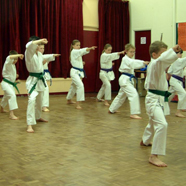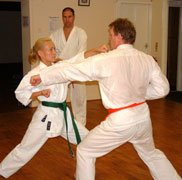 It is quite usual that a beginner will contact a school and go along and start, without even looking or asking about the school. A large school does not necessarily mean a good school; nor does its location. We have had many students over the years that have come from other schools after being disillusioned in what they have been or are being taught. Let me provide you with a simple true example from Karate.
It is quite usual that a beginner will contact a school and go along and start, without even looking or asking about the school. A large school does not necessarily mean a good school; nor does its location. We have had many students over the years that have come from other schools after being disillusioned in what they have been or are being taught. Let me provide you with a simple true example from Karate.
I had a college that trained in another school and style and he came up to me and said,
“I have just achieved my 1stst Dan Black Belt”
My reply was:
“Well done, and now what are you doing for your 2ndnd Dan Black Belt?”
He Said:
“Well, the same as my 1st Dan, but now making sure my techniques of punching and kicking are on target.”
I did not want to tell him that we teach this from a beginner, as he has now got to relearn his muscle memory to get it on target. It may have disillusioned him with his current school.
This is just one aspect of selecting the right school. Some of my students have come to me because their old instructors were not bothered in them, or just let them punch bags, or run around. Here in Kodokan Martial Arts we teach traditionally for Bujutsu (Martial Arts). I’m not saying all other schools are bad, as there are a lot of good instructors out there. All I’m saying is to make sure you look at them closely.
 After all there can be many pitfalls in choosing a good martial art school, as certificates and belts can be obtained very easily. For example, printing off your own certificate, purchasing your own belt, and learning from many DVD’s on the market today is second nature for a lot of instructors. Therefore, it is very easy for would be instructors to set up schools in a variety of places and teach martial arts and pass on poor quality instruction.
After all there can be many pitfalls in choosing a good martial art school, as certificates and belts can be obtained very easily. For example, printing off your own certificate, purchasing your own belt, and learning from many DVD’s on the market today is second nature for a lot of instructors. Therefore, it is very easy for would be instructors to set up schools in a variety of places and teach martial arts and pass on poor quality instruction.
So, a student needs to make sure they choose a good school in order that they are being taught a good system. They need to get information about the school and the instructor, and don’t be afraid to ask for proof; a good instructor will always be willing to provide this information. This will confirm that they are a bona fide instructor of the system and associated to an authentic association.
Types of Questions to ask:
- What are the qualifications of the instructor?
- Are they associated to a good organisation?
- How long have they been training in the system that they are teaching?
- Are they still being taught by a recognised instructor? Just because they have a 6th Dan doesn’t mean they don’t need a Sensei of a higher standard.
- Do they have a Disclosure & Barring Service (DBS) Checked done on them?
- Are they First Aid Qualified?
- Are they willing to provide proof of the above information? A good instructor will always say yes and not be offended.
So please Ask Before Making your decision.

